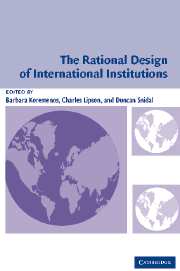Book contents
- Frontmatter
- Contents
- Contributors
- Abstracts
- Title Page
- The Rational Design of International Institutions
- Trust Building, Trust Breaking: The Dilemma of NATO Enlargement
- The Optimal Design of International Trade Institutions: Uncertainty and Escape
- Most-Favored-Nation Clauses and Clustered Negotiations
- Situation Structure and Institutional Design: Reciprocity, Coercion, and Exchange
- Private Justice in a Global Economy: From Litigation to Arbitration
- Multilateralizing Trade and Payments in Postwar Europe
- The Institutional Features of the Prisoners of War Treaties
- Institutions for Flying: How States Built a Market in International Aviation Services
- Driving with the Rearview Mirror: On the Rational Science of Institutional Design
- Rational Design: Looking Back to Move Forward
- References
Private Justice in a Global Economy: From Litigation to Arbitration
Published online by Cambridge University Press: 28 October 2009
- Frontmatter
- Contents
- Contributors
- Abstracts
- Title Page
- The Rational Design of International Institutions
- Trust Building, Trust Breaking: The Dilemma of NATO Enlargement
- The Optimal Design of International Trade Institutions: Uncertainty and Escape
- Most-Favored-Nation Clauses and Clustered Negotiations
- Situation Structure and Institutional Design: Reciprocity, Coercion, and Exchange
- Private Justice in a Global Economy: From Litigation to Arbitration
- Multilateralizing Trade and Payments in Postwar Europe
- The Institutional Features of the Prisoners of War Treaties
- Institutions for Flying: How States Built a Market in International Aviation Services
- Driving with the Rearview Mirror: On the Rational Science of Institutional Design
- Rational Design: Looking Back to Move Forward
- References
Summary
The study of private settlement of cross-border trade and investment disputes through international commercial arbitration or other mechanisms has been much neglected by scholars of international political economy and international institutions. This oversight is attributable in part to the traditional focus of international relations on intergovernmental international organizations and the lack of attention to private international institutional arrangements. A further reason for the oversight is that arbitration is resolutely private, making information exceedingly difficult to obtain. Two distinguished international arbitrators, Alan Redfern and Martin Hunter, recently observed that the study of the practice of international commercial arbitration is like peering into the dark. Few arbitral awards are published and even fewer procedural decisions of arbitral tribunals come to light.
Despite this difficulty, private forums for international commercial dispute resolution, of which international arbitration is an increasingly popular type, deserve much closer attention by scholars of international relations. After virtually disappearing during the age of nation-state ideology in the nineteenth century, international commercial arbitration has been staging a formidable comeback in the past twenty years. Today's scene calls to memory the flourishing era of arbitration practices and institutions associated with the international trade fairs of medieval Europe. The number of arbitration forums has grown from a dozen or so in the 1970s to more than one hundred in the 1990s, and the caseload of major arbitral institutions has more than doubled during the same period.
- Type
- Chapter
- Information
- The Rational Design of International Institutions , pp. 159 - 188Publisher: Cambridge University PressPrint publication year: 2003



